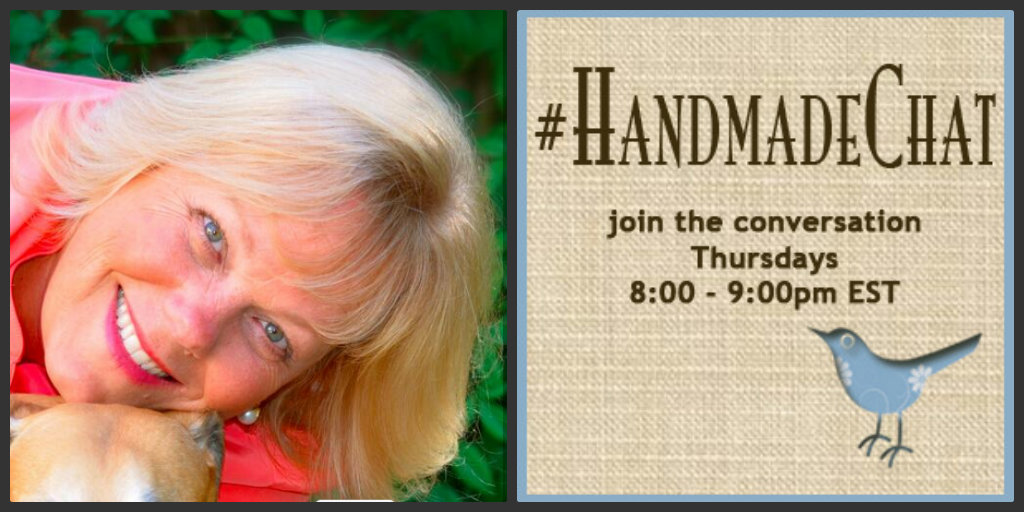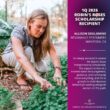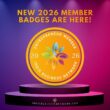On Thursday evenings from 8 to 9pm ET, IBN hosts #HandmadeChat, a Twitter talk show to to educate, train and inspire creative and artisan entrepreneurs to be successful business owners. While the show is aimed mainly at business owners who make and sell handmade consumer products, the topics and discussions can empower and encourage the growth of any small business.
This week's chat was sponsored by Elements Bath and Body, affordable supplies, packaging, ingredients, and accessories for soapers, candle makers, crafters, and hobbyists.

Our guest was Joan Morais of Joan Morais Naturals in Fairfield, California. Joan's mission is to teach others how to make the best natural and organic body, hair and skin care products and build successful businesses selling them. Here is some of what Joan shared on our show.
Q1 HOW DO YOU DEFINE “NATURAL,” WHEN IT COMES TO COSMETICS?
“Natural” cosmetics are made from raw materials sourced from nature. They include things like plants, minerals and bee products (beeswax, honey, propolis) — things from a renewable natural source. Natural raw materials undergo the least amount of processing, and the processing methods have minimal impacts on humans, animals and the earth.
Natural cosmetics assist in beautification, and promote radiant body, skin and hair. For an ingredient to be natural, it must not be petroleum-based, and no animal testing should be done on the substance. For a reliable list of “naturals,” you can use the Natural Products Association's list of certified personal care ingredients here.
Q2 WHAT ARE THE FIRST THINGS TO CONSIDER WHEN FORMULATING HANDMADE NATURAL COSMETICS TO SELL?
First, you must understand how to properly preserve any product containing water. Incorporating a preservative system is very important for products requiring preservatives.
Get to know and embrace Good Manufacturing Practices (GMP). Here are the FDA's Good Manufacturing Practice Guidelines.
Make sure you have reliable sources for all ingredients in your formulas. Nothing is worse than perfecting a formula and not being able to reliably source ingredients so you can make your products.
Learn to price your products so you can make a profit. Include all costs, and know how much the product will cost per ounce to produce, and how much your customers will pay for your products.
Q3 HOW DO YOU LEARN TO FORMULATE COSMETICS NATURALLY AND SAFELY?
You take classes and read a lot. Take classes and consultations from instructors and formulators in the industry. Learn from people who do microbial testing on products, and learn from people who can teach you how to implement GMP. Learn from cosmetics chemists. You can also learn a lot from food chemists since many of the same types of ingredients are used in cosmetics and food products.
Q4 WHAT ARE SOME OF THE MOST COMMON AND READILY AVAILABLE INGREDIENTS FOR NATURAL COSMETICS?
There are many! Here are a few I work with frequently: coconut oil, sunflower oil, olive oil, shea butter and cocoa butter. Natural ingredients can become scarce since they are from nature, so it is important to know which ingredients are readily available and in abundant supply.
Q5 ARE THERE ANY INGREDIENTS TO AVOID WHEN FORMULATING NATURAL BATH AND BODY PRODUCTS?
The FDA lists ingredients to avoid. These ingredients are generally not available from reputable suppliers to the industry.
Q6 IS SHELF LIFE IMPORTANT FOR ALL COSMETICS, INCLUDING SOAPS?
Yes. Cosmetics are transported in hot trucks, sit on shelves, and are stored in hot cars and in purses under all kinds of unpredictable conditions. If cosmetics are not properly preserved, bacteria yeast and mold can thrive. Generally, a 2-year shelf life is standard for natural products, unless otherwise stated. The natural oils in cold process handmade soap go rancid after a time, so the general shelf life for cold process soap is about 2 years.
Q7 DO ALL COSMETICS PRODUCTS NEED PRESERVATIVES?
No. Anhydrous (containing no water) products generally don’t need a preservative. Any cosmetic product containing water needs a preservative.
Q8 OTHER THAN FORMULATING, WHAT SHOULD YOU CONSIDER IF YOU WANT TO SELL THE COSMETICS YOU MAKE?
You must consider regulations, both federal and any in your area. As I stated already, GMP should be included, as should needed preservatives and/or microbial testing, and also, testing on the stability of your products and their packaging. It's also a great idea (and fun) to ask your customers to test your products. You get excellent feedback that way.
Q9 WHAT PRODUCTS DO YOU RECOMMEND PEOPLE MAKE FIRST, IF THEY ARE JUST GETTING STARTED, AND WHY?
I recommend everyone start with anhydrous products, that is, those containing no water. Examples include oil-based products like cold process soap, lip balm, and body butter. They are simple to make and don’t require microbial testing. A beginner will feel more confident from success experienced making oil-based products first, and understanding the manufacturing process. This knowledge will assist greatly in learning to make water-based products like lotions and creams.
Q10 WHAT DO I DO FIRST BUSINESS-WISE IF I WANT TO HAVE A SUCCESSFUL COSMETICS BUSINESS?
Research the regulations in your area.
Take classes and learn the tools of the trade on making cosmetics and owning a small business.
Join a network such as Indie Business for support. (You can join IBN here!)
Start with 3-5 products, and add on as you grow.
Purchase product liability insurance. (Here are details about how you can purchase affordable product liability insurance with your IBN membership.)
Employ correct product pricing so you can make a profit.
Q11 WHO ARE SOME OF THE WOMEN YOU CONSIDER ROLE MODELS WHEN IT COMES TO LEADING NICHE COSMETICS COMPANIES, AND WHAT CAN WE LEARN FROM THEM?
Lela Barker at Bella Lucce: beauty from around the world, story with the products, product designs.
Benardett Jno-Finn at Senica Naturals: inspired by the Carribean and made in New Orleans to complement the founder's rich heritage and community.
Kari Gran at Kari Gran: elegant oil-based skin care products with natural, non-GMO ingredients and an inspiring health story.
Yolanda Cathcart at Londa's Body Care and Aromatherapy Oasis, where you can learn to make products.
These ladies are resilient, diligent and intelligent, and they continue building despite challenges. They are passionate about what they do and have clearly defined niches. The products and services they offer reflect their niches.
Creating a niche is important because it defines your passion and what you and your company are all about. This helps you be successful.
Q12 WHAT OTHER THINGS WOULD YOU LIKE TO SHARE ABOUT FORMULATING NATURAL HANDMADE COSMETICS TO SELL TO CONSUMERS?
Knowledge is power. Don’t let things like GMP and product testing scare you. Learn a little at at time and remember, it's a process. Just as there is a learning curve when it comes to learning to drive, there is a learning curve when it comes to cosmetics manufacturing. It is a process that requires patience, diligence, and passion.
Build your products and your business with a strong foundation by learning from others and adding your uniqueness.
Q13 PLEASE SHARE WHAT YOU ENJOY ABOUT BEING A MEMBER OF #INDIEBUSINESS IBN?
I enjoy the connecting with the community of entrepreneurs, small business support and product making support and information.
I enjoy the professionalism and intelligence of Donna Maria as the Indie Business leader.
More About Joan Morais
Joan Morais has been an IBN member since 2008. Through Joan Morais Naturals, Joan teaches classes and workshops, and offers consulting on how to make natural skin and body care products like lotions, creams, body butters, cold process soap, facial skin care products, bath fizzies, bath salts, aromatherapy massage oils, natural baby products, lotion bars, essential oil blends, soy candles and more. Classes are taught live in person, live online and via download, so there's something for everyone.
Connect with Joan:
When Is The Next #HandmadeChat?
The next #HandmadeChat will be Thursday, May 2, 2013, at 8pm ET, when Jennifer Rapp Peterson of Indie Made will share How To Launch a Successful E-Commerce Website.
Here's how to participate in #HandmadeChat.
Take the #HandmadeChat Survey so we can make #HandmadeChat even better!
Follow #HandmadeChat on Twitter.
The best coaching and mentoring for handmade entrepreneurs is at Indie Beauty Network. Click here to connect at our social network.



